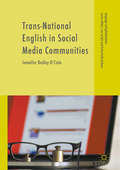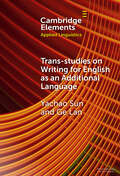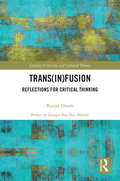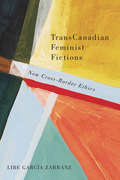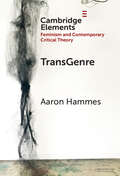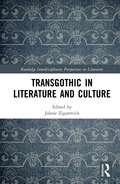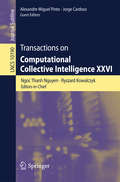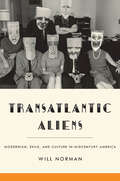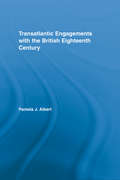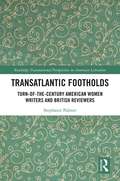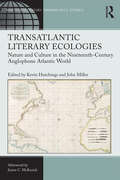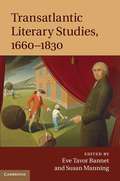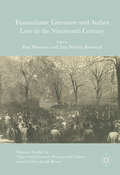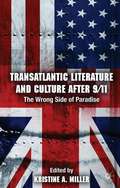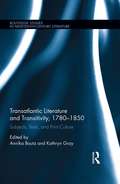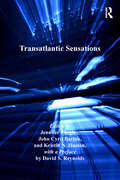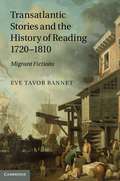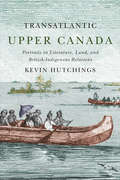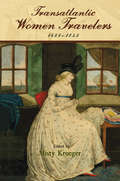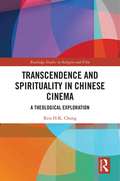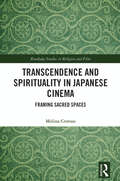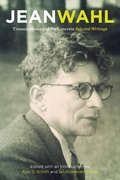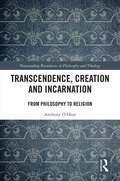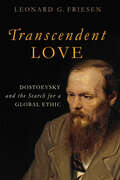- Table View
- List View
Trans-National English in Social Media Communities
by Jennifer Dailey-O’CainThis book explores the use of English within otherwise local-language conversations by two continental European social media communities. The analysis of these communities serves not only as a comparison of online language practices, but also as a close look at how globalization phenomena and ‘international English’ play out in the practices of everyday life in different non-English-speaking countries. The author concludes that the root of the distinctive practices in the two communities studied is the disparity between their language ideologies. She argues that community participants draw on their respective national language ideologies, which have developed over centuries, but also reach beyond any static forms of those ideologies to negotiate, contest, and re-evaluate them. This book will be of interest to linguists and other social scientists interested in social media, youth language and the real-world linguistic consequences of globalization.
Trans-studies on Writing for English as an Additional Language (Elements in Applied Linguistics)
by Yachao Sun Ge LanThis Element charts the historical development of trans-concepts in writing studies and scrutinizes the discussions surrounding translingual and second language (L2) writing. It further examines the emerging trends within trans-studies on writing and highlights the implications that trans-pedagogies hold for English as an Additional Language (EAL) writing. The element consists of five key sections: (1) the evolution and enactment of various trans-concepts in writing studies; (2) the concerns and debates raised by L2 writing scholars in response to these trans-terms; (3) a response to these reservations through a bibliometric analysis of current research trends; (4) the potential variations in trans-practices across different contexts and genres; and (5) the role of trans-pedagogies in facilitating or potentially hindering the process of EAL writing teaching and learning. This element serves as a resource for EAL writing educators by providing a comprehensive understanding of the potential benefits and challenges associated with trans-pedagogies.
Trans: Reflections for Critical Thinking (Literary Criticism and Cultural Theory)
by Ranjan GhoshTrans(in)fusion is a highly original book that tries to radicalize our ways of ‘critical thinking’ across disciplines. The book, refreshingly, brings into play critical philosophy, literary criticism, studies in mathematics, physics, chemistry and developmental biology, and various other disciplines and epistemes to set up a tenure and tenor of ‘critical thinking’. The book is an exclusive intervention in how thinking across traditions and systems of thought can generate distinct interpretive experiences. It questions, in a unique transcultural and transversal bind, our ways of hermeneutic and literary-cultural thinking. Trans(in)fusion resets the dialectics between text and theory.
TransCanadian Feminist Fictions: New Cross-Border Ethics
by Libe García ZarranzIn this contradictory era of uneven globalization, borders multiply yet fantasies of borderlessness prevail. Particularly since September 11th, this paradox has shaped deeply the lives of border-crossing subjects such as the queer, the refugee, and the activist within and beyond Canadian frontiers. In search of creative ways to engage with the conundrums related to how borders mould social and bodily space, Libe García Zarranz formulates a new cross-border ethic through post-9/11 feminist and queer transnational writing in Canada. Drawing on material feminism, critical race studies, non-humanist philosophy, and affect theory, she proposes a renewed understanding of relationality beyond the lethal binaries that saturate everyday life. TransCanadian Feminist Fictions considers the corporeal, biopolitical, and affective dimensions of border crossing in the works of Dionne Brand, Emma Donoghue, Hiromi Goto, and Larissa Lai. Intersecting the genres of memoir, fiction, poetry, and young adult literature, García Zarranz shows how these texts address the permeability of boundaries and consider the ethical implications for minoritized populations. Urging readers to question the proclaimed glamours of globality, TransCanadian Feminist Fictions responds to a time of increasing inequality, mounting racism, and feminist backlash.
TransGenre (Elements in Feminism and Contemporary Critical Theory)
by Aaron HammesTransGenre is a reconsideration of genre theory in long-form fiction through transgender minor literature in the US and Canada. Using four genre sites (the road novel, the mourning novel, the chosen family novel, and the archival novel), this Element considers how the minoritized becomes the minoritarian through deterritorializing generic conventions in fiction to its own ends. In so doing, TransGenre proposes narrative reading practices as strategies of the minor to subvert, transgress, and reappropriate the novel's genealogy and radical future prospects. A range of fiction published in the last decade is deployed as largely self-theorizing, generating its own epistemological, thematic, and formal innovations and possibilities, revealing cisheteronormative underpinnings of generic categories and turning them in on themselves.
TransGothic in Literature and Culture (Routledge Interdisciplinary Perspectives on Literature)
by Jolene ZigarovichThis book contributes to an emerging field of study and provides new perspectives on the ways in which Gothic literature, visual media, and other cultural forms explicitly engage gender, sexuality, form, and genre. The collection is a forum in which the ideas of several well-respected critics converge, producing a breadth of knowledge and a diversity of subject areas and methodologies. It is concerned with several questions, including: How can we discuss Gothic as a genre that crosses over boundaries constructed by a culture to define and contain gender and sexuality? How do transgender bodies specifically mark or disrupt this boundary crossing? In what ways does the Gothic open up a plural narrative space for transgenre explorations, encounters, and experimentation? With this, the volume’s chapters explore expected categories such as transgenders, transbodies, and transembodiments, but also broader concepts that move through and beyond the limits of gender identity and sexuality, such as transhistories, transpolitics, transmodalities, and transgenres. Illuminating such areas as the appropriation of the trans body in Gothic literature and film, the function of trans rhetorics in memoir, textual markers of transgenderism, and the Gothic’s transgeneric qualities, the chapters offer innovative, but not limited, ways to interpret the Gothic. In addition, the book intersects with but also troubles non-trans feminist and queer readings of the Gothic. Together, these diverse approaches engage the Gothic as a definitively trans subject, and offer new and exciting connections and insights into Gothic, Media, Film, Narrative, and Gender and Sexuality Studies.
Transactions on Computational Collective Intelligence XXVI
by Ngoc Thanh Nguyen Ryszard Kowalczyk Jorge Cardoso Alexandre Miguel PintoThese transactions publish research in computer-based methods of computational collective intelligence (CCI) and their applications in a wide range of fields such as the semantic Web, social networks, and multi-agent systems. TCCI strives to cover new methodological, theoretical and practical aspects of CCI understood as the form of intelligence that emerges from the collaboration and competition of many individuals (artificial and/or natural). The application of multiple computational intelligence technologies, such as fuzzy systems, evolutionary computation, neural systems, consensus theory, etc. , aims to support human and other collective intelligence and to create new forms of CCI in natural and/or artificial systems. This twenty-sixth issue is a special issue with selected papers from the First International KEYSTONE Conference 2015 (IKC 2015), part of the keystone COST Action IC1302.
Transatlantic Aliens: Modernism, Exile, and Culture in Midcentury America (Hopkins Studies in Modernism)
by Will NormanHow did the experience of transatlantic displacement shape literature, art, and thought in midcentury America?The intellectual migration to the United States of European writers, intellectuals, and artists in the 1930s and 1940s has often been narrowly seen as a clash between a rarefied European modernist sensibility and a debased American mass culture. In Transatlantic Aliens, Will Norman reorients our understanding of midcentury American culture by thinking dialectically about the interfusion of aesthetic and intellectual practices across both the cultural hierarchy and the Atlantic. The transatlantic exchanges of midcentury emerge in the book as a crisis point for modernism at which claims for the autonomy of high culture became increasingly untenable, the geographical center of cultural authority was displaced, and the governing principles of the American cultural field went through a phase of dramatic instability.Norman relays this critical narrative through a series of interlinked case studies of key figures, including C. L. R. James, Theodor Adorno, George Grosz, Raymond Chandler, Simone de Beauvoir, Vladimir Nabokov, and Saul Steinberg. He discovers the strange afterlives of European modernism in disorientating and uncanny juxtapositions: the aesthetics of French symbolism flicker among the neon signs of a small town in the dead of night, and echoes of Mondrian’s grids are observed in the form of a boardroom sales chart. At the heart of Transatlantic Aliens is a conception of alienation that encompasses both its political and aesthetic valences. What unites the exilic figures it addresses is the desire to transform the practical experience of alienation into a positive resource for criticizing and coping with a reconfigured postwar landscape. Addressed to scholars and readers of American and comparative literatures as well as of cultural history and visual culture, the book combines assessments of individual artworks, novels, and other texts with more distant readings spanning time and space. A gallery of color plates beautifully illuminates the book's analysis. Examining hardboiled fiction through Flaubert, New Yorker cartoons through modernist painting, and Bette Davis through Hegel and Marx, Transatlantic Aliens challenges and changes the way we understand modernism’s place in midcentury American culture.
Transatlantic Aliens: Modernism, Exile, and Culture in Midcentury America (Hopkins Studies in Modernism)
by Will Norman“A cogent and innovative account of the politics of literary and artistic modernism in the early years of the Cold War . . . an exceptional book.” —TransatlanticaIn Transatlantic Aliens, Will Norman reorients our understanding of midcentury American culture by thinking dialectically about the interfusion of aesthetic and intellectual practices across both the cultural hierarchy and the Atlantic. Norman relays this critical narrative through a series of interlinked case studies of key figures, including C. L. R. James, Theodor Adorno, George Grosz, Raymond Chandler, Simone de Beauvoir, Vladimir Nabokov, and Saul Steinberg. He discovers the strange afterlives of European modernism in disorientating and uncanny juxtapositions: the aesthetics of French symbolism flicker among the neon signs of a small town in the dead of night, and echoes of Mondrian’s grids are observed in the form of a boardroom sales chart. At the heart of Transatlantic Aliens is a conception of alienation that encompasses both its political and aesthetic valences. What unites the exilic figures it addresses is the desire to transform the practical experience of alienation into a positive resource for criticizing and coping with a reconfigured postwar landscape.Addressed to scholars and readers of American and comparative literatures as well as of cultural history and visual culture, the book combines assessments of individual artworks, novels, and other texts with more distant readings spanning time and space. A gallery of color plates beautifully illuminates the book’s analysis. Examining hardboiled fiction through Flaubert, New Yorker cartoons through modernist painting, and Bette Davis through Hegel and Marx, Transatlantic Aliens challenges and changes the way we understand modernism’s place in midcentury American culture.
Transatlantic Engagements with the British Eighteenth Century (Literary Criticism and Cultural Theory)
by Pamela J. AlbertTransatlantic Engagements with the British Eighteenth Century revisits eighteenth-century cultural artifacts through the lens of creative works produced by contemporary writers Beryl Gilroy (Guyana), Derek Walcott (St. Lucia), Wole Soyinka (Nigeria), and David Dabydeen (Guyana). While early studies of post-colonization literature focused on how revisions of historical works "write back" to the British empire, this study argues that trans-historical, cross-cultural dialogues also reveal the global complexity of eighteenth-century cultural forms (i.e. the periodical essay, travel narrative, pantomime, satirical engraving, and slave narrative). By transforming the generic form of their eighteenth-century sources, the African and Caribbean writers in this study strategically call attention to the modes of storytelling utilized by eighteenth-century writers Richard Steele, Daniel Defoe, Jonathan Swift, William Hogarth, Isaac Bickerstaff, and Ignatius Sancho, and subsequently expose how the encounters, exchanges, and acts of resistance taking place around the world influenced aesthetic experimentation in England. Transatlantic Engagements with the British Eighteenth Century is thus a reconsideration of eighteenth-century literature, art, and drama. However, because these engagements with British literature, art, and drama concurrently reflect twentieth-century encounters with neocolonial oppression, political violence, and racism, this study also proposes that engagements with the British eighteenth century double as inquiries into whether the modern world has progressed since the eighteenth century.
Transatlantic Footholds: Turn-of-the-Century American Women Writers and British Reviewers (Routledge Transnational Perspectives on American Literature)
by Stephanie PalmerTransatlantic Footholds: Turn-of-the-Century American Women Writers and British Reviewers analyses British reviews of American women fiction writers, essayists and poets between the periods of literary domesticity and modernism. The book demonstrates that a variety of American women writers were intelligently read in Britain during this era. British reviewers read American women as literary artists, as women and as Americans. While their notion of who counted as "women" was too limited by race and class, they eagerly read these writers for insight about how women around the world were entering debates on women’s place, the class struggle, religion, Indian policy, childrearing, and high society. In the process, by reading American women in varied ways, reviewers became hybrid and dissenting readers. The taste among British reviewers for American women’s books helped change the predominant direction that high culture flowed across the Atlantic from east-to-west to west-to-east. Britons working in London or far afield were deeply invested in the idea of "America." "America," their responses prove, is a transnational construct.
Transatlantic Literary Ecologies: Nature and Culture in the Nineteenth-Century Anglophone Atlantic World (Ashgate Series in Nineteenth-Century Transatlantic Studies)
by James C. McKusickOpening a dialogue between ecocriticism and transatlantic studies, this collection shows how the two fields inform, complement, and complicate each other. The editors situate the volume in its critical contexts by providing a detailed literary and historical overview of nineteenth-century transatlantic socioenvironmental issues involving such topics as the contemporary fur and timber trades, colonialism and agricultural "improvement," literary discourses on conservation, and the consequences of industrial capitalism, urbanization, and urban environmental activism. The chapters move from the broad to the particular, offering insights into Romanticism’s transatlantic discourses on nature and culture, examining British Victorian representations of nature in light of their reception by American writers and readers, providing in-depth analyses of literary forms such as the adventure novel, travel narratives, and theological and scientific writings, and bringing transatlantic and ecocritical perspectives to bear on classic works of nineteenth-century American literature. By opening a critical dialogue between these two vital areas of scholarship, Transatlantic Literary Ecologies demonstrates some of the key ways in which Western environmental consciousness and associated literary practices arose in the context of transatlantic literary and cultural exchanges during the long nineteenth century.
Transatlantic Literary Studies, 1660–1830
by Susan Manning Eve Tavor BannetThe recently developed field of transatlantic literary studies has encouraged scholars to move beyond national literatures towards an examination of communications between Britain and the Americas. The true extent and importance of these material and literary exchanges is only just beginning to be discovered. This collection of original essays explores the transatlantic literary imagination during the key period from 1660 to 1830: from the colonization of the Americas to the formative decades following political separation between the nations. Contributions from leading scholars from both sides of the Atlantic bring a variety of approaches and methods to bear on both familiar and undiscovered texts. Revealing how literary genres were borrowed and readapted to a different context, the volume offers an index of the larger literary influences going backwards and forwards across the ocean.
Transatlantic Literature and Author Love in the Nineteenth Century
by Ann Wierda Rowland Paul WestoverThis book is about Anglo-American literary heritage. It argues that readers on both sides of the Atlantic shaped the contours of international 'English' in the 1800s, expressing love for books and authors in a wide range of media and social practices. It highlights how, in the wake of American independence, the affection bestowed on authors who became international objects of celebration and commemoration was a major force in the invention of transnational 'English' literature, the popular canon defined by shared language and tradition. While love as such is difficult to quantify and recover, the records of such affection survive not just in print, but also in other media: in monuments, in architecture, and in the ephemera of material culture. Thus, this collection brings into view a wide range of nineteenth-century expressions of love for literature and its creators.
Transatlantic Literature and Culture After 9/11
by Kristine A. MillerLooking back on more than a decade of the US-run and UK-supported "war on terror," this volume examines how transatlantic literature and culture have challenged notions of American exceptionalism since September 11, 2001. The essays look not only at but also beyond the compulsion to relive this moment of terror, whether in recurring episodes of silencing trauma or repeating loops of media images. Conceiving of 9/11 as both a uniquely American trauma and a shared event in global history, the collection reexamines Ground Zero through the lenses of imperial power and cosmopolitan exchange. The book's subtitle challenges readers to engage this perspective by rethinking the paradox of paradise, a condition of both never-ending bliss and everlasting death. As the self-appointed economic and military gatekeeper of an imagined global paradise, America plays a dangerous moral and political game. This volume asks whether the United States has perhaps chosen the wrong side of paradise by waging war on terror rather than working for global peace.
Transatlantic Literature and Transitivity, 1780-1850: Subjects, Texts, and Print Culture (Routledge Studies in Nineteenth Century Literature)
by Annika Bautz Kathryn GrayThis book makes an important contribution to transatlantic literary studies and an emerging body of work on identity formation and print culture in the Atlantic world. The collection identifies the ways in which historically-situated but malleable subjectivities engage with popular and pressing debates about class, slavery, natural knowledge, democracy, and religion. In addition, the book also considers the ways in which material texts and genres, including, for example, the essay, the guidebook, the travel narrative, the periodical, the novel, and the poem, can be scrutinized in relation to historically-situated transatlantic transitions, transformations, and border crossings. The volume is underpinned by a thorough examination of historical and conceptual frameworks and prioritizes notions of circulation and exchange, as opposed to transfer and continuance, in its analysis of authors, texts, and ideas. The collection is concerned with the movement of people, texts, and ideas in the currents of transatlantic markets and politics, taking a fresh look at a range of canonical and popular writers of the period, including Austen, Poe, Crèvecoeur, Brockden Brown, Sedgwick, Hemans, Bulwer-Lytton, Dickens, and Melville. In different ways, the essays gathered together here are concerned with the potentially empowering realities of the transitive, circulatory, and contingent experiences of transatlantic literary and cultural production as they are manifest in the long nineteenth century.
Transatlantic Sensations (Ashgate Series in Nineteenth-Century Transatlantic Studies)
by John Cyril Barton Kristin N. Huston a Preface ReynoldsBringing together sensation writing and transatlantic studies, this collection makes a convincing case for the symbiotic relationship between literary works on both sides of the Atlantic. Transatlantic Sensations begins with the 'prehistories' of the genre, looking at the dialogue and debate generated by the publication of sentimental and gothic fiction by William Godwin, Susanna Rowson, and Charles Brockden Brown.Thus establishing a context for the treatment of works by Louisa May Alcott, Mary Elizabeth Braddon, Dion Boucicault, Wilkie Collins, Charles Dickens, George Lippard, Charles Reade, Harriet Beecher Stowe and George Thompson, the volumetakes up a wide range of sensational topics including sexuality, slavery, criminal punishment, literary piracy, mesmerism, and the metaphors of foreign literary invasion and diseased reading. Concluding essays offer a reassessment of the realist and domestic fiction of George Eliot, Charlotte Yonge, and Thomas Hardy in the context of transatlantic sensationalism, emphasizing the evolution of the genre throughout the century and mapping a new transatlantic lineage for this immensely popular literary form. The book's final essay examines an international kidnapping case that was a journalistic sensation at the turn of the twentieth century.
Transatlantic Stories and the History of Reading, 1720–1810
by Eve Tavor BannetEve Tavor Bannet explores some of the remarkable stories about the Atlantic world that shaped Britons' and Americans' perceptions of that world. These stories about women, servants, the poor and the dispossessed were frequently rewritten or reframed by editors and printers in America and Britain for changing audiences, times and circumstances. Bannet shows how they were read by examining what contemporaries said about them and did with them; in doing so, she reveals the creatively dynamic and unstable character of transatlantic print culture. Stories include the 'other' Robinson Crusoe and works by Penelope Aubin, Rowlandson, Chetwood, Tyler, Kimber, Richardson, Gronniosaw, Equiano, Cugoano Marrant, Samson Occom, Mackenzie and Pratt.
Transatlantic Upper Canada: Portraits in Literature Land and British-Indigenous Relations (McGill-Queen's Transatlantic Studies #2)
by Kevin HutchingsLiterature emerging from nineteenth-century Upper Canada, born of dramatic cultural and political collisions, reveals much about the colony's history through its contrasting understandings of nature, ecology, deforestation, agricultural development, and land rights. In the first detailed study of literary interactions between Indigenous people and colonial authorities in Upper Canada and Britain, Kevin Hutchings analyzes the period's key figures and the central role that romanticism, ecology, and environment played in their writings. Investigating the ties that bound Upper Canada and Great Britain together during the early nineteenth century, Transatlantic Upper Canada demonstrates the existence of a cosmopolitan culture whose implications for the land and its people are still felt today. The book examines the writings of Haudenosaunee leaders John Norton and John Brant and Anishinabeg authors Jane Johnston Schoolcraft, Peter Jones, and George Copway, as well as European figures John Beverley Robinson, John Strachan, Anna Brownell Jameson, and Sir Francis Bond Head. Hutchings argues that, despite their cultural differences, many factors connected these writers, including shared literary interests, cross-Atlantic journeys, metropolitan experiences, mutual acquaintance, and engagement in ongoing dialogue over Indigenous territory and governance. A close examination of relationships between peoples and their understandings of land, Transatlantic Upper Canada creates a rich portrait of the nineteenth-century British Atlantic world and the cultural and environmental consequences of colonialism and resistance.
Transatlantic Women Travelers, 1688-1843 (Transits: Literature, Thought & Culture 1650-1850)
by Eve Tavor Bannet Victoria Barnett-Woods Ula Lukszo Klein Misty Krueger Diana Epelbaum Shelby Johnson Grace Gomashie Pam Perkins Jennifer Golightly Alexis McQuigge Octavia Cox Kathleen MorrisseyThis important new collection explores representations of late seventeenth- through mid-nineteenth-century transatlantic women travelers across a range of historical and literary works. While at one time transatlantic studies concentrated predominantly on men’s travels, this volume highlights the resilience of women who ventured voluntarily and by force across the Atlantic—some seeking mobility, adventure, knowledge, wealth, and freedom, and others surviving subjugation, capture, and enslavement. The essays gathered here concern themselves with the fictional and the historical, national and geographic location, racial and ethnic identities, and the configuration of the transatlantic world in increasingly taught texts such as The Female American and The Woman of Colour, as well as less familiar material such as Merian’s writing on the insects of Surinam and Falconbridge’s travels to Sierra Leone. Intersectional in its approach, and with an afterword by Eve Tavor Bannet, this essential collection will prove indispensable as it provides fresh new perspectives on transatlantic texts and women’s travel therein across the long eighteenth century.
Transcendence and Spirituality in Chinese Cinema: A Theological Exploration (Routledge Studies in Religion and Film)
by Kris H.K ChongThis book provides a framework by which a global audience might think theologically about contemporary films produced in mainland China by Chinese directors. Up to this point the academic discipline of Christian theology and film has focussed predominantly on Western cinema, and as a result, has missed out the potential insights offered by Chinese spirituality on film. Mainland Chinese films, produced within the nation’s social structure, offer an excellent lingua franca of China. Illuminating the spiritual imagination of Chinese filmmakers and their yearning for transcendence, the book uses Richard A. Blake’s concept of afterimage to analyse the potential theological implications of their films. It then brings Jürgen Moltmann’s "immanent-transcendence" and Robert K. Johnston’s "God’s wider Presence" into conversation with Confucianist and Daoist ideas of there being, spirituality-speaking, "More in Life than Meets the Eye" than simply material existence. This all combines to move beyond film and allow for a Western audience to gain a new perspective on Chinese culture and traditions. One that uses familiar Western terms, while avoiding the imposition of a Western mindset. This is a new perspective on cinema, religion and Chinese culture that will be of keen interest to scholars of Religion and Film, Religious Studies, Theology, Sociology of Religion and Chinese Studies.
Transcendence and Spirituality in Japanese Cinema: Framing Sacred Spaces (Routledge Studies in Religion and Film)
by Melissa M. CroteauThis book explores significant representations of Shinto and Buddhist sacred space, spiritual symbols, and religious concepts that are embedded in the secular framework of Japanese films aimed at general audiences in Japan and globally. These cinematic masterpieces by directors Akira Kurosawa, Hayao Miyazaki, Hirokazu Kore-eda, and Makoto Shinkai operate as expressions of and, potentially, catalysts for transcendence of various kinds, particularly during the Heisei era (1989-2019), when Japan experienced severe economic hardship and devastating natural disasters. The book’s approach to aesthetics and religion employs the multifaceted concepts of ma (structuring intervals; liminal space-time), kū (emptiness; sky), mono no aware (compassionate sensibility; resigned sadness), and musubi (generative interconnection), examining the dynamic, evolving nature of these ancient principles that are at once spiritual, aesthetic, and philosophical. Scholars and enthusiasts of Japanese cinema (live action and anime), religion and film, cinematic aesthetics, and of the relationship between East Asian religions and the arts will find fresh perspectives on these in this book, which moves beyond conventional notions of transcendental style and essentialized approaches to the multivalent richness of Japanese aesthetics.
Transcendence and the Concrete: Selected Writings (Perspectives in Continental Philosophy)
by Jean WahlJean Wahl (1888–1974), once considered by the likes of Georges Bataille, Gilles Deleuze, Emmanuel Levinas, and Gabriel Marcel to be among the greatest French philosophers, has today nearly been forgotten outside France. Yet his influence on French philosophical thought can hardly be overestimated. Levinas wrote that “during over a half century of teaching and research, [Wahl] was the life force of the academic, extra-academic, and even, to a degree anti-academic philosophy necessary to a great culture.” And Deleuze, for his part, commented that “Apart from Sartre, who remained caught none the less in the trap of the verb to be, the most important philosopher in France was Jean Wahl.”Besides engaging with the likes of Bataille, Bergson, Deleuze, Derrida, Levinas, Maritain, and Sartre, Wahl also played a significant role, in some cases almost singlehandedly, in introducing French philosophy to movements like existentialism, and American pragmatism and literature, and thinkers like Hegel, Kierkegaard, Nietzsche, Jaspers, and Heidegger. Yet Wahl was also an original philosopher and poet in his own right. This volume of selections from Wahl’s philosophical writings makes a selection of his most important work available to the English-speaking philosophical community for the first time.Jean Wahl was Professor of Philosophy at the Sorbonne from 1936 to 1967, save during World War II, which he spent in the United States, having escaped from the Drancy internment camp. His books to appear in English include The Pluralist Philosophies of England and America (Open Court, 1925), The Philosopher's Way (Oxford UP, 1948), A Short History of Existentialism (Philosophical Library, 1949), and Philosophies of Existence (Schocken, 1969).
Transcendence, Creation and Incarnation: From Philosophy to Religion (Transcending Boundaries in Philosophy and Theology)
by Anthony O'HearThis book expounds and analyses notions of transcendence, creation and incarnation reflectively and personally, combining both philosophical and religious insights. Preferring tender-minded approaches to reductively materialistic ones, it shows some ways in which reductive approaches to human affairs can distort the appreication of our lives and activities. In the book’s first half it examines a number of aspects of human life and experience in the thought of Darwin, Ruskin, and Scruton with a view to exploring the extent to which there could be intimations of transcendence. The second half is then devoted to outlining an account of divine creation and incarnation, deriving initially, though not uncritically, from the thought of Simone Weil. The text concludes by examining the extent to which grace is needed to engage in religious practice and belief. Taking in art, literature, music and classical Greek writings, this is a multifaceted thesis on transcendence. It will, therefore, will be of keen interest to any scholar of Philosophy of Religion, Theology, Aesthetics and Metaphysics.
Transcendent Love: Dostoevsky and the Search for a Global Ethic
by Leonard G. FriesenIn Transcendent Love: Dostoevsky and the Search for a Global Ethic, Leonard G. Friesen ranges widely across Dostoevsky's stories, novels, journalism, notebooks, and correspondence to demonstrate how Dostoevsky engaged with ethical issues in his times and how those same issues continue to be relevant to today's ethical debates. Friesen contends that the Russian ethical voice, in particular Dostoevsky's voice, deserves careful consideration in an increasingly global discussion of moral philosophy and the ethical life. Friesen challenges the view that contemporary liberalism provides a religiously neutral foundation for a global ethic. He argues instead that Dostoevsky has much to offer when it comes to the search for a global ethic, an ethic that for Dostoevsky was necessarily grounded in a Christian concept of an active, extravagant, and transcendent love. Friesen also investigates Dostoevsky's response to those who claimed that contemporary European trends, most evident in the rising secularization of nineteenth-century society, provided a more viable foundation for a global ethic than one grounded in the One, whom Doestoevsky called simply "the Russian Christ." Throughout, Friesen captures a sense of the depth and sheer loveliness of Dostoevsky's canon.
